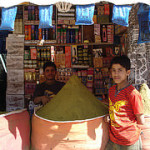On September 15-16, 2016, the Global Open Data for Agriculture & Nutrition (GODAN) Summit will be held in New York. At the summit, IFPRI will be co-hosting a side-event called Precision Agriculture. IFPRI has been at the forefront of providing open-access data to improve policies.
Formulating Scenarios for Reconstruction and Development in Yemen
IFPRI assessed in 2012 the economic impacts of the socioeconomic changes and scenarios for reconstruction and development in Yemen
Securing Cereal Availability in Ethiopia
IFPRI’s research in Ethiopia dispelled the commonly believed causes of cereal price hikes: cross-border trade, increased demand for consumption, diversification into high-value crops, and speculative hoarding. In 2006, Ethiopian cereal prices were rising sharply and threatened food security, especially for net cereal purchasers. To develop research-based evidence to inform policy responses to the price spikes, IFPRI conducted a set of studies that examined agricultural production, markets, and prices within the country.
Building Resilience to Food Price Crises
In response to the world food price crisis of 2007–2008, IFPRI, in collaboration with the EC, the Swiss Agency for Development and Cooperation, and more recently PIM, launched the Food Security Portal (FSP). Since its inception, the FSP has been equipping policy makers with evidence and analytical tools to address food security challenges.
Re-Examining European Union Biofuel Policies
In April 2015, the EU Parliament voted in favor of amending the Renewable Energy Directive and related legislation to reduce the risk of indirect land-use change. IFPRI’s research helped inform the Parliament’s discussions and decision.
Exploring the Future of Global Food and Nutrition Security: FOODSECURE
FOODSECURE, a research project funded by the EC, analyzed how domestic and international policies affect food and nutrition security. As part of a consortium of 18 institutions, IFPRI, with the help of the CGIAR Research Program Policies, Institutions, and Markets (PIM), provided high-quality research, models and databases, and access to a network of developing-country researchers, particularly in Africa.



